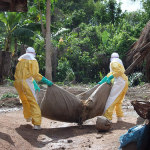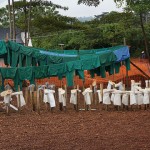Conflicting messages on the length of time that Ebola remains in semen after recovery make education and prevention confusing. We need to avoid mixed messages and focus on girls’ rights, says anthropologist Pauline Oosterhoff. When I met members of a women’s secret society in Sierra Leone this February, they proposed drastic measures to stop Ebola from spreading through sexual contact. All survivors should be quarantined for three months, they said. Male survivors need to be locked up because they cannot control their urge to have sex. Women
Continue reading →
I’m trying not to make my commentary about the current Ebola outbreak about representation, but I’ve been a bit troubled by the political analyses accompanying the epidemiological and health systems ones. Specifically, I want to talk a bit about how Liberia’s and Sierra Leone’s civil wars have been deployed by these analysts to understand the response to the outbreak and how explaining existing tensions requires some deeper knowledge about local context. Laurie Garrett’s recent opinion piece on CNN and her appearance on Melissa Harris-Perry’s show are both examples of
Continue reading →
Over two thirds of all human infectious diseases have their origins in animals. The rate at which these zoonotic diseases have appeared in people has increased over the past 40 years, with at least 43 newly identified outbreaks since 2004. In 2012, outbreaks included Ebola in Uganda, yellow fever in the Democratic Republic of Congo and Rift Valley fever (RVF) in Mauritania. Zoonotic diseases have a huge impact – and a disproportionate one on the poorest people in the poorest countries. In low-income countries, 20%
Continue reading →


